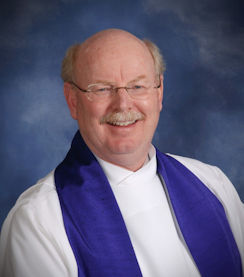Rev. John Boley is giving up potatoes for the sake of his health. As he looks ahead to the future of The United Methodist Church, he lists other things he must give up for the health of the Body of Christ.
REV. JOHN BOLEY
Clergy Assistant, Michigan Area
 So over the years, often when groups I’ve been in do some get-acquainted exercises, the question is asked, “What is your favorite food?” This question has been used a couple of times recently for staff and leadership gatherings on the formation of the new Michigan Conference.
So over the years, often when groups I’ve been in do some get-acquainted exercises, the question is asked, “What is your favorite food?” This question has been used a couple of times recently for staff and leadership gatherings on the formation of the new Michigan Conference.
My answer is almost always, “Boiled Potatoes.” It happens to be true and it fits my genetics with my Scottish and Irish blood. But it usually is greeted with laughter, and some fun, good-natured ridicule.
I was diagnosed with Type II Diabetes a few years ago – me and the rest of America. It has been relatively stable, but it is now time to be a little more vigilant in managing diet and exercise. Ugh.
And so I have finally decided that I am willing to mostly give up complex carbs and starches as part of my diet – white rice, bread, potatoes, pasta, and corn. I’ve toyed with this in the past, but not seriously. Now it’s time to be a bit more serious. It’s hard to change a lifetime of eating a certain way. Boiled potatoes are about as basic as food gets, it’s a good thing that I have liked them so much.
I don’t want to give up boiled potatoes, let alone those other starches and carb-heavy foods that I love. But I guess I have to. Giving up boiled potatoes is cruel and unusual punishment that I think is outlawed in Leviticus and should be outlawed in the Book of Discipline and the United States Constitution.
We are in a time in the United Methodist Church when we are being asked to give up some of our boiled potatoes. Here are some of the basic, beloved boiled potatoes that I must give up in our beloved United Methodist Church.
1. As a compatibilist and large tent Christian, I will need to give up the compelling desire for a large, diverse denomination with a wide variety of demographics and geography; and with different theological truths holding each other in tension. A split is inevitable over human sexuality, and perhaps it’s the best thing, but a big part of me believes that we are still better off together – avoiding the great Protestant heresy of always splitting up.
2. As a baby-boomer who grew up in the 1950’s style church, I will need to give up that particular model of church, including its civil religion, its worship styles, and its community orientations. Phyllis Tickle’s work has been beneficial to me to understand that we are entering into a new era. My 1950’s style church is a thing of the past – time to let it go.
3. I will need to transform my understanding of connectionalism to include a much higher dose of congregational polity. Greater autonomy and independence of individual congregations seems to be the current desire – to the detriment of connectional understandings. It is probable that the new expressions of Methodism will not be as highly structured or “disciplined,” leaving much more room for congregational diversity and polity.
4. I will need to give up a polity with itineracy at its center. I still believe that itineracy is the best way to deploy pastors. Of course, it has been under constant stress, and new generations are much less inclined. It is probable that the new expressions of Methodism will be much less tied to the Methodist itineracy of the past and present.
5. I must give up current understandings of the professional clergy (but not the professionalism of clergy). My entire career has been spent pursuing and supporting a professional clergy. New expressions of Methodism probably will continue the trend of part-time and bi-vocational clergy, with a much more diminished line between ordained clergy and lay leadership.
6. I must give up generational arrogance. Every generation believes that it has its act together and that the succeeding generation cannot do things nearly as well. But it’s time for the millennials to take over. They are dedicated, extremely capable, and unflappable. They will take the Methodist movement and the Christian church into this next era – all to the glory and service of Christ. Thanks be to God for that.
Last Updated on September 20, 2022

